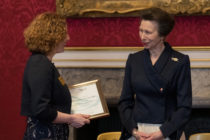KATHRYN BRUDERER (National Probation Service, North West)

KATHRYN BRUDERER (National Probation Service, North West)
COMMENDEE 2018-19: Kathryn is an Equality Manager for the North West National Probation Service. She is Commended for her work developing and delivering services for people with autism and learning difficulties, and securing the division’s status as the first in probation to be accredited by the National Autistic Society.
Initial Nominator and the North West National Probation Service (NPS) Head of Cumbria, Sarah Ward, explains that it was Kathryn’s initial inspiration and drive that led to the North West NPS submitting a bid for HMPPS funding to work with the National Autistic Society ‘to improve the capacity of NPS staff to identify offenders with conditions on the autism spectrum and then be able to access appropriate support for them to successfully complete their order or licence.’ As Sarah goes on to note, ‘This wasn’t being seen as a national priority at the time and was a gap in staff capacity that Kathryn had identified by herself…Lancashire NPS cluster has become the first part of the NPS nationally to be awarded accreditation by the National Autistic Society…a huge achievement and has meant a great deal of additional work on Kathryn’s behalf, on top of her existing busy role.’
As well as forming and leading an implementation team in Lancashire, Kathryn has ‘relentlessly championed the needs of this particular group of offenders.’ As one colleague wrote:
‘Kathryn has worked tirelessly to ensure that NPS NW provides an exemplary service to service users with Learning Disabilities and Autism Spectrum conditions. She demonstrates real passion, care and a sense of responsibility for all areas of equality and diversity and her work has had a measurable positive impact for staff, stakeholders and service users.’
Part of this work involved Kathryn taking a lead in improving the physical environment of Probation Offices, ensuring they support the engagement and compliance of offenders with sensory sensitivities. Further, a toolkit for offender managers is being developed ‘to help support staff in offender management and court make appropriate reasonable adjustments if necessary and understand and accurately assess and manage the risk of harm posed by offenders with autism and learning difficulties.’
[In 2014, The Butler Trust addressed this issue as part of its Dissemination work in a practice-focused workshop, Management and Care of Offenders with Learning Disabilities, Custody and Community, run in conjunction with the Prison Reform Trust].
As Sarah additionally notes, Kathryn ‘is able to influence strategic decisions at a divisional and national level. Her innovative approach to working with autism is attracting interest at a national NPS level and she is regularly invited to speak at multi-agency conferences to promote this work. It is her desire to improve outcomes for offenders that she would speak most passionately about if asked what she enjoyed about her work.’
Another colleague, a member of the NW NPS Equality and Diversity Committee, described Kathryn’s ‘unquestionable application to task’ and her ‘genuine warmth of concern and attachment to those people being otherwise disadvantaged by society’ along with ‘a personality and charisma that inspires others.’ Sarah concludes by calling Kathryn ‘a shining example of someone who thinks beyond the constraints of the job in order to achieve tangible outcomes for disadvantaged individuals.’
Local Butler Trust Champion and NW Divisional Hub Business Manager, Deborah Lowe concurs, saying that Kathryn ‘really does stand out from the crowd in her ability to recognise where she needs to focus her attention and then how to achieve the best outcomes’, adding that ‘it is very much a vocation and something Kathryn takes very seriously.’
Nor is Kathryn resting on her laurels. For the coming year, she has submitted a further three bids to the Ministry of Justice, says Deborah, ‘for projects she thinks the North West should commit to in order to improve the way we work with disadvantaged groups of offenders. This shows the continuing passion and drive she has to improve the experience of under-represented and offender groups with protected characteristics.’
Claudia Ricketts-Royle, a Senior Probation Officer and colleague, agrees, calling Kathryn ‘an avid champion that seeks inclusivity across all protected characteristics.’ Another Senior Probation Officer and colleague, Rachel Willetts, agrees, saying Kathryn ‘demonstrates real passion, care and a sense of responsibility for all areas of equality and diversity and her work has had a measurable positive impact for staff, stakeholders and service users.’
Deputy Director, Roz Hamilton, is pleased to report that the North West NPS ‘is the only part of the national service to be recognised by an external organisation as being worthy of accreditation because of the way we support offenders with autism to engage, reduce their risk of re-offending and harm and support them to complete their community sentence or licence.’ It took Kathryn’s ‘innovative skills to initiate and implement’ this achievement, demonstrating ‘the passion and commitment she gives to this role, and it demonstrates the extraordinary impact that the work of one dedicated person can have upon so many staff and offenders. We are very lucky to have her in the North West Division.’
Kathryn is keen to develop this regional achievement into a national policy, and is working to do so, while taking on new possibilities. She reports, for example, that ‘this year, I am also excited to have secured funding for a pilot for improving our approach for Deaf offenders – this is an area where I identified that there was little national guidance on, and so I plan to set up a network of Deaf champions who will receive training and development to act as points of contact for resources, signposting and guidance to other staff.’
And while her colleagues contributed their own testimonials to her work, Kathryn generously says that ‘I am proud to work with colleagues who are as passionate as I am about fairness and inclusion, and the work outlined above would not have been successful without them.’
